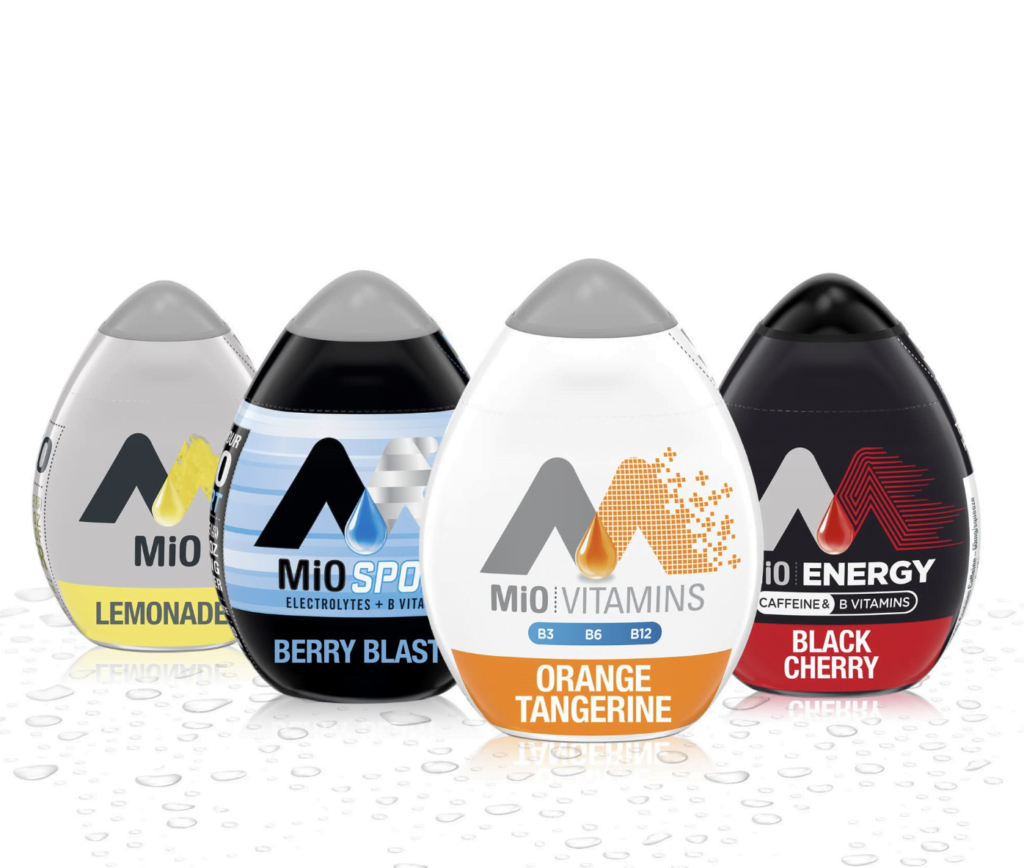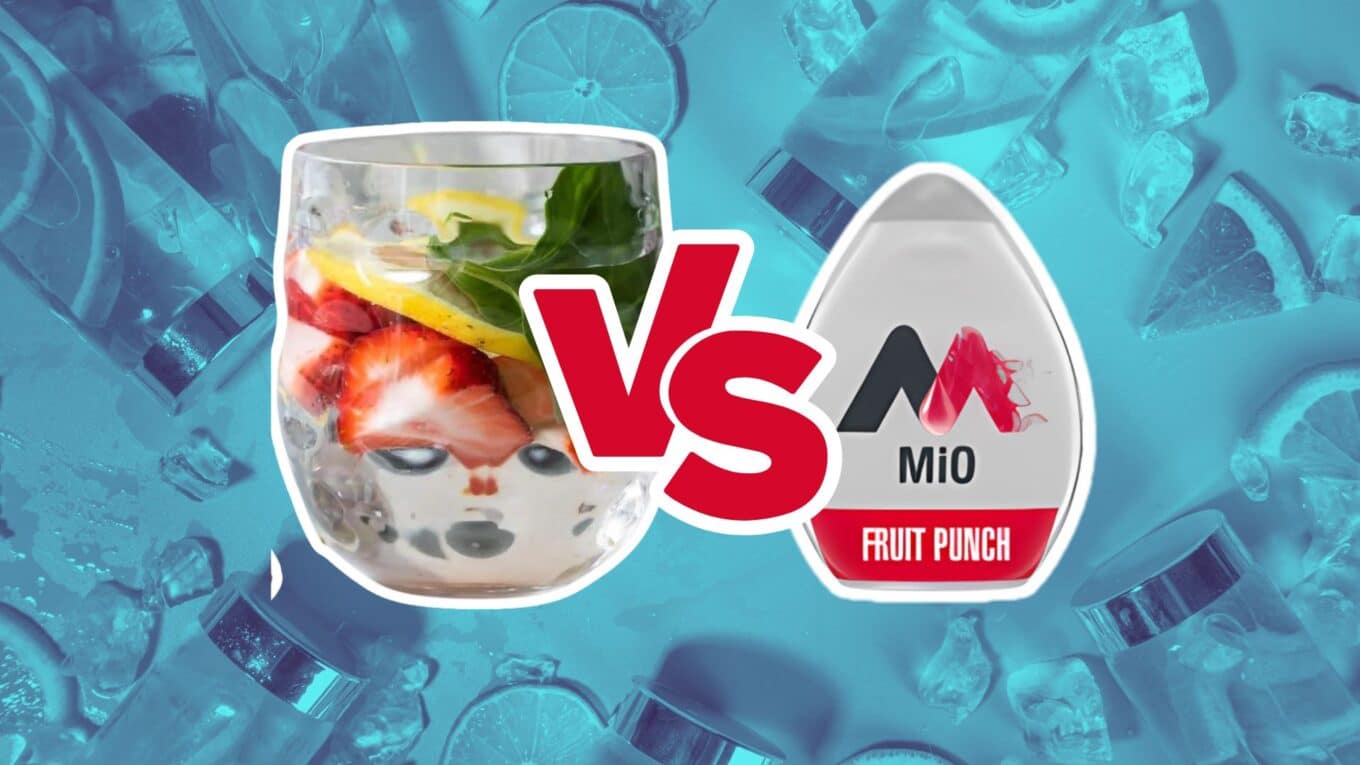Struggling to drink enough water because it’s bland? You’re not alone.
Many people find it challenging to stay hydrated when plain water doesn’t appeal to them.
Mio water enhancers claim to solve this problem by adding flavor and nutrients to your water, making it more enjoyable to drink. But are these products a healthy choice?
In this article, we’ll explore the potential health impact of Mio compared to naturally flavored water options.
Discover the key differences between these two approaches to flavoring your water and learn how to make an informed decision that supports your overall health and well-being.
What is MiO: Composition and Use

MiO is a liquid water enhancer created by Kraft Heinz to make drinking water more appealing and enjoyable.
Its purpose is to add flavor to water without contributing extra sugars or calories, encouraging people to stay hydrated.
Four Main Product Lines
- MiO Original offers basic flavors for everyday use.
- MiO Vitamins contain added vitamins B3, B6, and B12 for an extra nutritional boost.
- MiO Electrolytes, designed for athletes and active individuals, have sodium and potassium to support hydration.
- MiO Energy includes caffeine and other ingredients to provide an energy boost.
Ingredients in MiO
MiO primarily uses artificial sweeteners like acesulfame potassium (Ace-K) and sucralose to provide sweetness without the calories.
However, there are ongoing studies and potential health concerns surrounding these sweeteners.
Some MiO products, particularly in the Vitamins line, use natural sweeteners like stevia, a plant-based alternative for those seeking a more natural option.
In addition to sweeteners, MiO Energy contains caffeine, taurine, guarana, and ginseng to enhance energy and alertness.
Usage and Storage
Each serving of MiO is 1/2 teaspoon (2 mL), designed to flavor 8 ounces (237 mL) of water.
It’s important to remember that MiO is a concentrated liquid and must be diluted with water before consumption.
Once opened, MiO should be used within 30 days for optimal freshness and flavor.
It does not require refrigeration but should be stored in a cool, dry place, avoiding exposure to excessive heat or freezing temperatures.
Possible Advantages of MiO
One of MiO’s main advantages is its potential to increase hydration by making water more appealing to drink.
The variety of flavors and zero-calorie options may encourage people to consume more daily water.
MiO’s sugar-free nature can help individuals avoid excess calorie and sugar intake, which benefits those managing weight or blood sugar levels.
Some MiO products, particularly those in the Vitamins and Electrolytes lines, contain added nutrients that support overall health and hydration.
This can be especially helpful for active individuals or those with specific nutritional needs.
Possible Drawbacks of MiO
Despite its potential benefits, MiO also has some possible drawbacks related to its ingredients.
Artificial sweeteners like Ace-K and sucralose are controversial. Some studies suggest potential negative health effects and raise concerns about their environmental persistence.
Research has also indicated that these sweeteners may disrupt gut bacteria and affect insulin response, although more studies are needed to understand their impact fully.
Another concern is the use of artificial dyes and preservatives in MiO.
Some food dyes have been linked to hyperactivity and allergic reactions, while preservatives like propylene glycol and potassium sorbate may cause adverse effects with high exposure.
What is Natural Flavored Water?

Natural flavored water is simply water enhanced with natural ingredients like fruits, herbs, and vegetables to improve its taste without relying on artificial additives.
Lemon, mint, berries, cucumber, and other fruits and herbs are common ingredients in naturally flavored water.
Ways to Flavor Water Naturally
There are several methods to flavor water naturally.
One popular approach is to create fruit and herb infusions by combining fresh ingredients in water and allowing them to steep, imparting their natural flavors.
Another option is herbal or caffeine-free teas, which can add subtle flavors and provide additional health benefits.
Natural sweeteners like honey can be added to the water for those who enjoy a touch of sweetness.
Lastly, using naturally flavored spring water as a base can enhance the overall taste profile.
Possible Advantages of Natural Flavored Water
One of the primary advantages of natural flavored water is the absence of artificial additives, synthetic chemicals, and preservatives.
This can appeal to individuals who prefer a more natural water flavoring.
The natural ingredients can also provide extra vitamins and minerals, contributing to overall nutrition.
Natural flavored water supports hydration without the potential drawbacks associated with artificial ingredients, making it an attractive choice for health-conscious consumers.
Things to Consider While Having Natural Flavored Water
While natural-flavored water offers several benefits, there are some practical considerations to consider.
Preparing natural-flavored water often requires more time and effort than using store-bought enhancers like MiO.
Fresh ingredients have a shorter shelf life and must be consumed relatively quickly to ensure optimal flavor and freshness.
MiO vs. Natural Flavored Water
| Aspect | MiO | Natural Flavored Water |
|---|---|---|
| Health Benefits | Contains added vitamins and electrolytes in specific product lines | Contains natural vitamins and minerals from ingredients |
| Supports hydration | Supports hydration | |
| Zero calories and sugar-free | No artificial additives | |
| Safety and Risks | It contains artificial sweeteners (acesulfame potassium, sucralose) and preservatives. | Relies on whole, natural ingredients |
| Potential long-term health effects under investigation | Generally, it poses fewer health risks. | |
| Contains artificial dyes | No artificial sweeteners, preservatives, or dyes | |
| Environmental concerns related to artificial sweeteners and packaging | Lower environmental impact | |
| Practicality and Ease | Highly convenient and accessible | Requires time and effort to prepare |
| Quick and easy to use | It involves selecting, washing, and infusing ingredients. | |
| More budget-friendly in the short term | Potentially lower long-term costs if ingredients are homegrown or bought in bulk |
Conclusion
Consider your health goals and preferences when choosing between MiO and natural-flavored water.
While MiO offers convenience and a variety of flavors, it contains artificial sweeteners and preservatives that may have potential long-term health effects.
On the other hand, natural flavored water provides a more wholesome option, with the added benefits of vitamins and minerals from natural ingredients.
Ultimately, staying hydrated is crucial for overall well-being, and finding a method that encourages you to drink more water is key.
Whether you opt for the ease of MiO or the natural goodness of infused water, prioritize hydration in your daily routine.
Which option do you prefer, and how has it impacted your water intake? Share your thoughts in the comments below!




